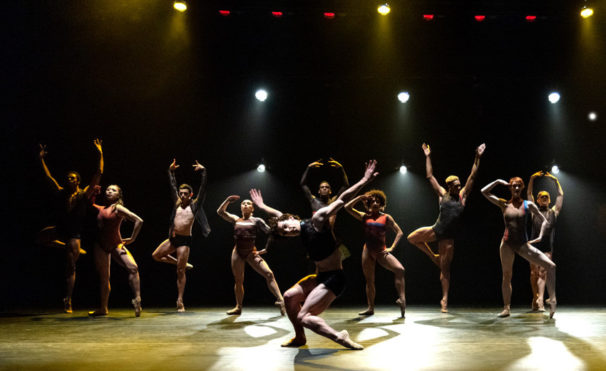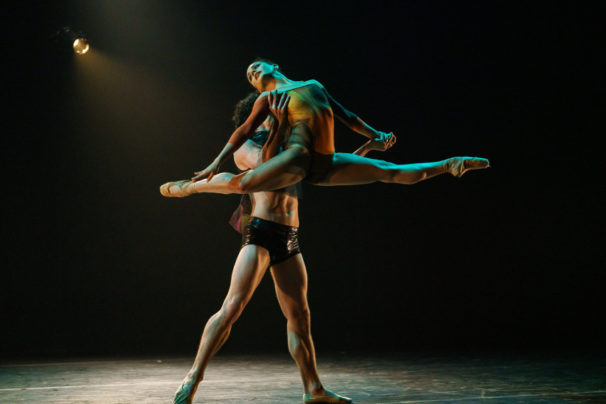
Complexions Contemporary Ballet performing WOKE. photo: Nina Wurtzel
Complexions Contemporary Ballet continues to prod, provoke, and entertain. When choreographer Dwight Rhoden and dance-superstar Desmond Richardson co-founded their rainbow coalition of a ballet troupe in 1994, it took hold. Spurred by their mentor Alvin Ailey, the two men staked their claim on the power of dance diversity. Twenty-five years later, mainstream ballet is still not diverse; Richardson just retired as Complexions’ lead dancer; and Rhoden, the longtime resident dance maker, is journeying beyond “skin deep.” Having forged a dance troupe that looks like real America, Rhoden is using the non-verbal art form to express how the nation thinks, reacts and talks.
The 40-minute WOKE, essentially a protest ballet, is the first of two works in the Carpenter Center’s Complexions performance Saturday, October 5. Woke will have its West Coast debut in Long Beach after its world premiere at the Joyce Theater in New York City last spring.
“I have done other political things,” said Rhoden, in a phone interview from New York. “But it’s been a minute since I dived into something so pointed.” Since Rhoden, 57, passes his days with dancers much younger than himself, he’s privy to rehearsal chatter. “This generation of young people is very motivated about letting their voices be heard,” he said. “That, in tandem with the fact that the issues are poignant and affect our daily lives, makes it crucial that we find understanding and move forward as one.”
WOKE takes on hot-button issues—guns, immigration, LGBTQ and women’s rights. Its score, sure to be funky, comprises contemporary-classical music, rap, hip-hop, electronic pop, and R&B, remixed from original tracks by Kendrick Lamar, Logic, Drake, and Diplo. The polarized playing field of American politics might be off-putting for many. But if choreographic courage is called for, count Rhoden in.

The Dayton Ohio-born, former Ailey dancer is a provocateur. Known for his cool look, he shagged his hair into a startling Mohawk, then a stand-up buzz cut, when neither was the going look in a ballet studio. Then he firmly rejected the idea that classical technique exclusively suits the white body. Wrangling some of New York’s finely trained ballet dancers, color-blind, and placing the spectacular Richardson, his male muse, front and center, Rhoden shattered ballet norms.
Eighty dances later, you cannot mistake a Rhoden work. His dance language spews in abundance, with his gifted dancers tossing off, with insouciance, extreme leg extensions (with lifted hips to get there), off-kilter balances, extenuated and elastic partnering. Critics grouse that it’s over the top and repetitive. But audiences cannot get enough.
Transmuting politics into lively arts—music, poetry, visual arts, dance—has long been a hallmark of African-American political protest, according to Dr. Keith Claybrook of the Department of Africana Studies at Cal State, Long Beach. WOKE fits with that tradition, in a fascinating way. As far back as the slaveships, said Claybook in a phone interview, “Africans were brought to the deck by their enslavers believing they were letting them exercise. But the drumming was empowering; they were communicating with the deities they believed in, and with each other. They would sing songs that made fun of their enslavers, in front of them. A revolt was [often] preceded by dancing, chanting or singing.”
This carried through to the sixties. “With SNCC, Bernice Johnson (founder of Sweet Honey in the Rock) said the activists would not only pray, they would sing and dance before they went into action,” said Claybrook.

photo: Steven Pisano.
After digesting WOKE, the audience will sail through STAR DUST: A Tribute to David Bowie, Rhoden’s paean to the king of glitter rock. “I grew up in the ‘70s loving rock and loving Bowie,” he admitted. Those who missed Star Dust in its world premiere last season at the Dorothy Chandler Pavilion will want to catch it at the Carpenter Center.
To the sound of nine highly familiar Bowie songs, dancers in glam-wear and facial paint embody what Rhoden calls Bowie’s “super theatrical” music. “The David Bowie piece was a labor of love,” he said. “I am a huge Bowie fan. I listened to all of his albums; loved his chameleonic persona, mostly, how he continued to change his perspective.”
These two works together form a programming coup for the Center in its 25th anniversary season. Both are dances for and of our time. Regarding the creation of Woke, Rhoden said, “I felt a responsibility. It felt it was something I had to do.” As for Stardust, “I like rock and roll too. It’s all music; our skins are toned a little different, but it is one race of people. It’s about appreciating the difference, loving and celebrating it, rather than making it divisive.”
ed. note: The Carpenter Center is presenting yet another very important African-American choreographer, Kyle Abraham, who is bringing his company A.I.M. by Kyle Abraham to Long Beach on Jan 25, 2020.
Dance critic Debra Levine is editor/publisher of arts•meme, the fine-arts blog she founded in 2008.
Complexions Contemporary Ballet | Karen and Richard Carpenter Performing Arts Center | Sat Oct 5
